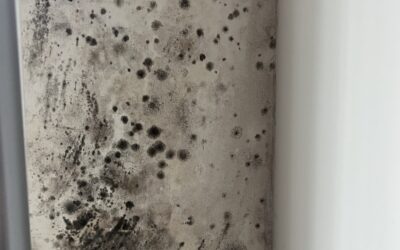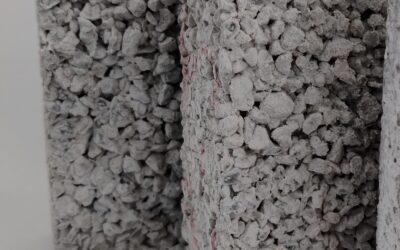Molds, Allergies and Indoor Air Quality: A Crucial Issue for Companies
Indoor air quality is a determining factor in employee well-being and productivity.
In companies, where work environments are often shared by many people, mold and allergy management is becoming a key priority for managers concerned about the health of their employees and overall performance.

Molds: an invisible enemy
Molds are microscopic fungi that proliferate in damp, poorly ventilated environments. They can appear following water damage, water infiltration, capillary rise, etc. They produce small reproductive structures known as spores or conidia, which can disperse in the air and settle on various surfaces. Offices, warehouses and manufacturing areas are particularly vulnerable, especially if humidity levels are not properly controlled. They can also be present in ventilation ducts (Air Handling Units) and be dispersed into offices and other workspaces by the airflow.
Impact on employee health
Mold exposure can cause a variety of health problems, including allergic reactions such as sneezing, coughing, itchy eyes and skin irritations. For employees suffering from asthma or respiratory disorders, mold can aggravate symptoms and induce attacks, affecting their ability to work effectively. All these situations can contribute to work-related discomfort, loss of motivation and concentration difficulties. This discomfort can give rise to complaints to the CHSCT or Human Resources, and a deterioration in the general atmosphere within the company.
Focus on the inflammatory reaction
The physiological reaction that occurs in allergy sufferers can be an inflammatory reaction. This is a reaction to the immune system, which has set up tools to protect itself from foreign bodies, including mold spores. Foreign bodies contain antigens, the specific signatures of each microbe. When microbes are present on the human body (skin, mucous membranes, digestive tract), the immune system recognizes the microbe and uses a set of tools to protect itself (antibody, T or B lymphocyte…). In some cases, this protection is disproportionate to the aggression, and the body generates an excessive immune response, leading to alteration of normal tissues, hence the allergic reaction. Each person has a different immune response, depending on predisposition, prolonged contact with some molds…


Economic impact
Mould-related health problems can have significant economic repercussions for companies. Repeated absences of employees due to chronic illness or a feeling of malaise at work, lower productivity through reduced attention span, staff shortages and possible sick pay can represent significant costs. Moreover, a healthy working environment is a key factor in attracting and retaining talent.
Prevention and control strategies
To ensure good indoor air quality and minimize mold-related risks, companies need to adopt proactive measures:
- Effective ventilation: Ensure adequate ventilation in all workspaces, especially in humid areas such as break rooms and restrooms.
- Humidity control: Use dehumidifiers and keep humidity levels below 60%.
- Indoor air audits: Carry out regular audits to assess air quality and identify areas at risk.
- Regular maintenance: Carry out regular inspections and repairs to prevent water leaks and infiltration.
- Training and awareness: Train employees to recognize signs of mold and report any potential problems.
Conclusion
For companies, managing mold and ensuring good indoor air quality are essential elements in ensuring the health and well-being of employees, while optimizing productivity and reducing the costs associated with health problems. By adopting preventive measures and remaining vigilant, companies can promote a healthy and attractive working environment for all.
Our solutions associated with molds and allergy
Analysis of mold and air quality in offices
Testing the efficacy of air treatment systems against microorganisms
Related articles
FungiRESIST™ : An Advanced Platform for Studying Fungal Resistance
Humidity, materials, and mold: a trio posing a risk to indoor air quality
Bio-based Materials: Eco-friendly Allies, but What Are the Risks of Mold?
In response to the climate emergency, the construction sector is turning to more environmentally friendly solutions. Bio-based materials are emerging as sustainable alternatives to reduce the carbon footprint of buildings. However, these natural materials also present challenges, particularly in terms of moisture management and mold risks. This article explores the strengths and limitations of bio-based materials.
Let's work together !
If you have any needs or questions about environmental microbiology, contact us and we'll provide you with the answers you need.



